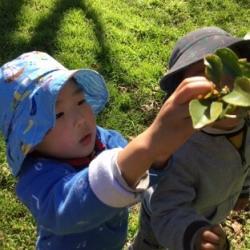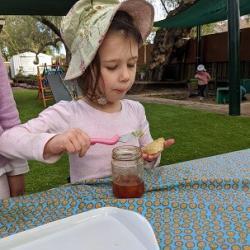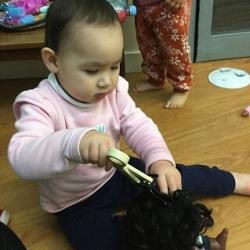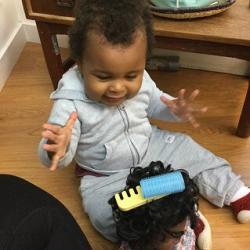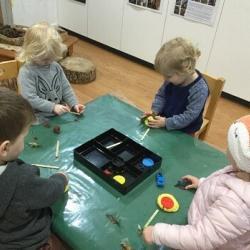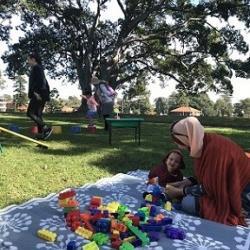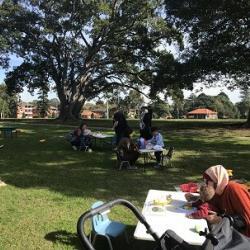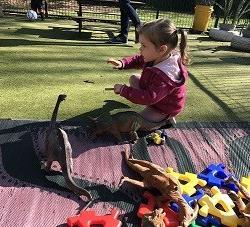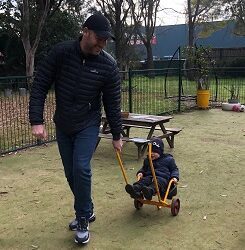Johnson House
During their walks in the grounds, the children in Johnson House have been discovering many exciting things. A recent discovery was that what they thought was a Kumquat tree actually turned out to be a Calamansi tree, which produces a citrus fruit. Upon having discussions with the families about this tree, there was an offer to make jam with the Calamansi fruit. The children excitedly picked the fruit ready to be made into jam. The children and educators were excited to receive the first fresh batch of jam, lovingly made by one of the families. It was such an exciting process for the children to see how the fruit could be picked and then made into jam. At a morning tea, the jam was offered to the children and was thoroughly enjoyed!
This was a great learning experience for the children and one that gave them the opportunity to use nature as a tool for learning and discovery.
Murray House
Infants
Dramatic play has been one of the children’s favourite play activities in Murray House infants, and is an ongoing interest. The children enjoy looking after and caring for the dollies, and pretending to cook in their new dramatic play kitchen with their new kitchen utensils.
Over the past weeks the educators in Murray House have also witnessed some of the children beginning to show interest in grooming and brushing children’s and educators’ hair! To support this new interest, educator Dalia created a dressing table for the children to extend their play. She added brushes, hair ties, combs, hair clips and other everyday objects.
The children have been busy visiting the dressing table to groom their hair using the new resources and some children even used the dollies to participate in their imaginary play too!
The educators have noticed meaningful learning and interactions occurring during these play experiences, and they see the children learning to interact positively with others as they share play and discover the adult world by dramatising familiar experiences.
Toddlers
This week the children in Murray House toddlers have continued to learn about the importance of handwashing and how to wash their hands properly. Through regular discussions many of them now know that they must wash hands before they eat and after using the bathroom. They’re also starting to remember that they need to wash hands when they arrive and before going home. The children are also continuing to revisit the bread experiment they started last week to help learn about germs. To assist the children to visualise and understand the concept of germs, a book called Do not lick this book, by Idan Ben-Barak and Julian Frost, was shared with small groups of children regularly throughout the week.
The children have also been working on the ‘potato people project’ with educator Deepa, based the story The Potato People, by Pamela Allen. Open ended-resources were provided for the children, and they were encouraged to use their creativity and motor skills to design their own potato people. They were very enthusiastic and proud of their creations! This sense of accomplishment will no doubt contribute positively to their developing self-identities.
The children have also been showing an interest in dinosaurs. This interest was extended upon by educators through the provision of playdough and small dinosaurs. The experience saw the children sharing their dinosaur knowledge with peers, learning dinosaur names, exploring footprints and creating dinosaur habitats with the dough. Through rolling, pounding, pressing or poking the dough they were also developing complex fine motor skills and finger strength. These skills are important for their subsequent learning such as handling writing tools.
Educator Mandy has been offering the Five Little Monkeys and Five Cheeky Monkeys songs and games for the children regularly in her language group this week. Number cards from 1 to 5, along with picture cards were provided to promote learning about mathematical concepts such as number recognition and rational counting. The children were encouraged to match each monkey with a number card to act as a crocodile to ‘snap’ the monkey according to the number embedded in the modified lyrics. The experience saw the children demonstrate their ability to share roles and take turns—most of them were able to take the initiative to pass ‘mummy monkey’, ‘doctor monkey’ and the crocodile to the child next to them in the group circle.
Playgroups
The Infants’ Home playgroups recommenced at the end of July after being suspended in February in response to restrictions on gatherings due to the coronavirus pandemic. Our playgroups now have COVID-safe measures, including an online booking system, to support us to maintain reduced group sizes, increased cleaning, social distancing and shorter session times. This has not affected families’ interest in the playgroups, with our Red Bug and Fathers and Male Carer’s playgroups very well attended so far, and the bookings for the next few weeks looking healthy. We hope that the attendance at our most recent playgroup to re-open, the Wangal playgroup at Ashfield Public School, builds in the same way.
The children who have been attending playgroups have demonstrated an understanding of the ‘new normal’ that they are living in, and their resilience in being able to take part in a world with vastly different conditions to those when they last attended playgroups. The children are perfectly comfortable seeing educators and other adults in masks, understand the hand sanitising routine and are aware of the need for social distancing (although they are still developing the skills to do this well, as are we all!)
An example of how embedded for children this new way of being in the world has become was when one of the children at the Fathers and Male Carer’s playgroup created beds for the ‘unwell’ dinosaurs to let them rest, and then started using a wooden screw from a nearby construction set to poke into the dinosaurs mouths. The playgroup facilitators watched with fascination as the child worked, wondering what she was doing. Finally she ran the wooden screw over the dinosaurs’ tails and informed them that she was doing a “tail test” to check if the dinosaurs were sick. It suddenly became clear—she was giving the dinosaurs the COVID test! The playgroup facilitators happily offered to help, extending the child’s thinking by suggesting they place the swabs in plastic baggies to send away for testing and remembering to put on masks and gloves before more swabs were taken.
This was a wonderful example of how children make meaning of their world and the events that affect them through their play. If you have noticed your children engaging in COVID-related play, know that this is a positive sign—learn more here.

